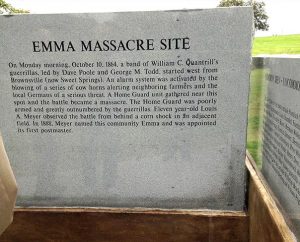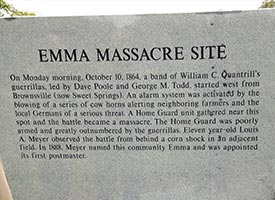By John Patrick Niles
EMMA, Mo. — About 150 people attended a special dedication Oct. 12 for a memorial here commemorating 26 German immigrants who defended their homes and families from South-sympathizing guerrillas during the Civil War.

The Emma Massacre Monument was dedicated on a cloudy and cool Sunday on the grounds of Holy Cross Lutheran Church.
The celebratory dedication — featuring music, the presentation of colors and speeches — stood in stark contrast to the massacre it recognized.
The stone memorial recounts the details from that day in the quaint town between Kansas City and Columbia, Mo.:
On Monday morning, October 10, 1864, a band of William G. Quantrill’s guerrillas, led by Dave Poole and George M. Todd, started west from Brownsville (now Sweet Springs). An alarm system was activated by the blowing of a series of cow horns alerting neighboring farmers and the local Germans of serious threat. A Home Guard unit gathered near this spot and the battle became a massacre. The Home Guard was poorly armed and greatly outnumbered by the guerrillas. Eleven year-old Louis A. Meyer observed the battle from behind a corn shock in an adjacent field. In 1888, Meyer named this community Emma and was appointed its first postmaster.
About 50 men over the age of 40 and teenage boys fought against the more numerous and better-armed guerrillas.
Many of those who attended the dedication are related to the immigrants who were killed that day 150 years ago.
The men put the safety of their families and neighbors ahead of any fears they had for their own lives, said David Hemme, chairman of the 150th Emma Massacre Memorial Dedication Committee.
“Each and every year we celebrate Veterans Day and there are articles written in the local newspapers recounting the bravery of those who died in battle,” Hemme said. “We have cemetery services. The names are read. Finally, these men are finally being recognized for their bravery and commitment to freedom. They were older men and boys. And they died. They died so their families would be kept safe.”
The hourlong ceremony included speeches by Chaplain Craig G. Muehler, director of the LCMS Ministry to the Armed Forces, retired U.S. Air Force Col. Joe Connell and several historians.
The names of those who were killed were read followed by the tolling of the bell at Holy Cross.
One story told by several people at the dedication centered on the Rev. Franz Julius Biltz, pastor of St. Paul Lutheran Church in Concordia, Mo., (about 3 miles from Emma) at the time of the massacre.
“It is rumored that Pastor Biltz was encountered by one of the German settlers involved in the skirmish and asked to borrow Biltz’s horse to get back into the action,” Muehler recalled. “Pastor Biltz obliged and walked the rest of the way home that day.”
Muehler also pointed out that Biltz essentially became a military chaplain to those who were involved in the massacre. He provided care for its survivors and for the families of those who gave their lives.
The Emma Massacre Monument can be seen about 1,000 feet south of Exit No. 62 off Interstate 70 in Missouri, north of Holy Cross Lutheran Church in Emma.
“Just as the stories of many who fight for the freedoms of our country go untold,” Muehler said after the Oct. 12 dedication, “the stories of chaplains and their ongoing care for soldiers often go untold. Day in and day out, chaplains work to provide spiritual care to those who protect our nation. Many of these stories are never told.
“Just as many answered the call on that day in 1864,” he continued, “the call has not ended. The church continues to provide care for those who defend our nation. This is a work that never ceases.
“As soldiers come back from war, they bear wounds and scars that remain long after any physical injury has healed. The LCMS Ministry to the Armed Forces helps to provide assistance for those who suffer these injuries.
“The latest statistics state that every day a veteran commits suicide,” Muehler pointed out. “This is a statistic that should wake up the church at-large to the ministry that is before it. The work of these men of remarkable valor and the chaplains that seek to serve them does not need to go unnoticed. There are ways to be involved right now.”
For more information about military chaplains and how to become involved in care for veterans, contact Muehler at 800-248-1930, ext. 1346.
The Rev. John Patrick Niles is associate pastor of St. Paul Lutheran Church in Concordia, Mo.
Posted Oct. 29, 2014 / Updated Oct. 30, 2014 / Updated Oct. 31, 2014
